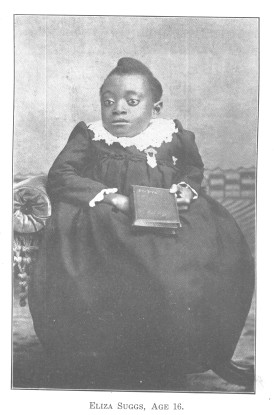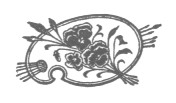The Octoroon. | |
| 1. |
In the palmy days of slavery, A score of years ago, A pretty, dark-skinned Octoroon Was singing soft and low A song to please her baby As in her arms it lay, A dainty, dimpled, fair-haired boy-- A twelve-month old that day. |
| 2. |
Strange home for child or mother! For her quick ear often heard, 'Mid the clink of dice and glasses, Many a loud and angry word. For her Phillip was a gambler; But she never dreamed or thought Of any shame or sorrow For the wrongs he might have wrought. |
| 3. |
"He plays 'seven-up' 'till midnight," She often laughing told, "And then, like other gentlemen, Comes home and counts his gold."> |
| 4. |
So she was always happy, Singing French songs, sweet and wild, With a. voice as full of music As the laughing of a child. But, the midnight, she was waiting For his footstep on the stair, Came a sound of measured meaning Throbbing on the silent air! |
| 5. |
Came a sound of troubled voices, Filling all her soul with dread-- Comrads, bearing up a burden, Cold and lifeless! Phil was dead! Like a sudden blow, it smote her With a desolate sense of grief, But no faintness came to shield her, And no tears to bring relief. |
| 6. |
Oh, to escape the heart-ache, And the dumb bewildering pain. How gladly would she fall asleep And never wake again! Yet, she watched with heart near breaking As they bore his form away; Then she listened to the prosing Of two lawyers old and gray. |
| 7. |
As they talked of debts of honor, Of the house, and horses fine, Of, plate, perhaps and jewels; Of furniture and wine; Then! Ah! Then, what was the meaning Of the words they muttered o'er? As they said: "The wench and baby Ought to bring a thousand more!" |
| 8. |
Quickened ears and comprehension Caught each careless tone and word; Knew too well the tricks of trade To doubt the fearful truth she heard. But when they so roughly told her: "There will be a sale tomorrow!" Her voice broke forth in piteous wail Of bitterness and sorrow:-- |
| 9. |
"Oh, I know Phil never meant For me and baby to be sold! Why, I'se been his little woman Since I'se only twelve years old! He won me from the Captin, Playing 'seven-up' one night, And he's told me more'n a thousand times He's sure to make it right. |
| 10. |
The Captin was my father, Captin Winslow, of Bellair, And you can't sell me and baby-- O you can't! You never dare!" And those men, so used to suffering, And callous as they were, Looked in each other's faces And paused to pity her. |
 | |
| Eliza Suggs, Age 16. | |
| 11. |
But "many a case was just as bad, And some perhaps were worse; They could do nothing, anyhow, The law must take its course." The broken hearted mother Tried in vain to sleep that night, Her busy brain would conjure up Some possible means of flight. |
| 12. |
Well she knew she was a prisoner, That the house was thronged with men; Knew, too, that for years this place Had been a noted gambler's den, And a long, low vaulted chamber Ran beneath the basement floor, Opening far beyond detection, In a heavy, hidden door. |
| 13. |
She shuddered with a vision Of the bloodhounds on her track, As she thought deadly certain They would be to bring her back! |
| 14. |
O, she could not, could not bear it! She would kill herself and him! Then, across her 'wildered memory Stole a vision faint and dim, Of some reverent childish teaching, Prayer to God, and faith and fear-- "Lead us not into temptation!" Was He listening? Did He hear? |
| 15. |
Then she thought of old Aunt Dinah, Who had taught her thus to pray, Living free in Oppoloosa, Half a score of miles away. |
| 16. |
And at last, she rose, determined That the danger should be braved; Though her life might pay the forfeit, Little Phillip should be saved! So she wrapped her sleeping treasure In a mantle dark and thin, Tied a gaudy-hued bandana 'Neath her smoothly-rounded chin, |
| 17. |
Planned her flight to escape detection, And removing every trace. With a subtle, stealthy movement Of a leopard, left the place. And she paused not in the journey,-- Life or death still lay before! 'Till she struggled, worn and weary, To Aunt Dinah's cabin door. |
| 18. |
Hush! a voice of prayer and pleading On the midnight calm is heard:-- "Teach us, Lord, through all our blindness To believe Thy precious word. Help us when our hearts are heavy; Guide us when we go astray; Lead us in the paths we know not, Nearer to Thee, day by day." |
| 19. |
With her spirit vision opened By some unseen inner sight, Old Aunt Dinah had arisen And was praying in the night In her strong, black arms she gathered Weary mother, wondering child; And she listened to their story Full of anguish, fierce and wild. |
| 20. |
Knowing well she could not save them, That her love though strong and bright, Was as chaff before the whirlwind Of the white man's power and might "I would give my poor old heart's blood, Every drop for yours and you, If I could but keep you, honey, From this path you'r walking through. |
| 21. |
But, I've seen it all too often; They will hunt you if you hide, They will catch you if you'r fleeing, They will take you from my side; And they'll take your baby from you, Stop! De Lord's own voice I hear; Will you trust your precious darling To my care and leave him here? |
| 22. |
"I will keep him from all danger; Hide him where no eye can see; And 'twill be a comfort deary, If you always know he's free. Don't look so; give me the baby; Yes, I know how hard it is, But we do the Father's bidding, Not in our way, but in His. |
| 23. |
"I will pray for you tomorrow; Now the moon is going down, You must take my little donkey, Child, and hurry back to town. Ride him just as far's you dare to, Then tie up the bridle rein, Turn his head, he's done sartain To come right straight home again!" |
| 24. |
When next morning she was summoned From her room, she walked alone; Though her fierce, brown eyes burned darkly, They were tearless, dry as stone. And the lawyers and the keepers Looked at her and shrank away, 'Minded by her wondrous beauty Of a tigress turned at bay. |
| 25. |
But a query ran among them,-- Of the baby -- where was he? 'Till she heard their words and answered Very calmly -- "He is free!" "Free! The house was strongly guarded, Every window, every door; They had seen both child and mother Safely caged the night before! |
| 26. |
"Not a living thing had ventured O'er the threshold that they knew; And the hounds with hungry voices Bayed outside the whole night through." Instant search sufficed to show them That the baby was not there; Not a hint, or trace, or sign Could they discover anywhere. |
| 27. |
Then, with threatening look and gesture To the mother they returned, But she said in words triumphant, While her eyes more brightly burned:-- |
| 28. |
"Strike me! Minions! I expect it! Scourge me! burn me! beat or kill! But it will not help you find him, He is Free! my darling Phil! Think you, I would fear to hide him In the darkness of the grave? Ah, my baby's father's baby Was not born to be a slave!" |
| 29. |
So, with furtive eyes they watched her, Talking low 'mid fear and fright, Half afraid 'mid their bravado, She would vanish from their sight But she stood as stands the martyr, When his last frail hope dies out, And the murmuring sea of voices Rises to an angry shout. |
| 30. |
And she thought not of her beauty As her heart beat fast and faster, Gazing on those stranger faces, Wondering which would be her master. But, the horrid truth awoke her,-- "Going, going, gone!" It told That beyond all hope or dreaming, She was sold, -- to slavery sold! |
| 31. |
Then, as if the soul within her Larger grew with pain and strife, Or, as if some marble statue Started forth, a thing of life, Turned she, with the footsteps silent As a specter of the dead, From their m~dst she swiftly fled, Ere a hand could lift to stay her. |
| 32. |
On -- to where the lofty margin Overlooked the river's flood, There she paused and turned in triumph As upon its brink she stood: "Cowards! Do you dare to follow To your gulf, to find your slave? Think you that I fear to render Back to God the life He gave. |
| 33. |
Let him in his righteous Judgement Weigh the guilt 'twixt you and me; Let him guard my boy and keep him When his mother, too, is free! Back! you have no power to stay me! Stop! I would not hear you lie, Back! I laugh at you, my masters! Free I live! and free I die!" |
| 34. |
Turning with a look And a smile of proud disdain, Sprang she forth into the river, Sank, and rose -- and sank again. Onward swept the mighty river On its journey to the sea; But the mother's woes were ended-- Child and mother both were free. --Selected. |
